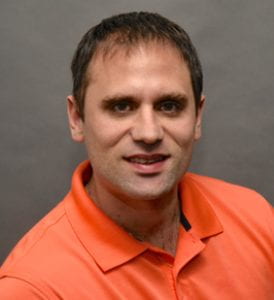For Teddy Kokoros, collaboration, connection, and information sharing come naturally. He maintains a blog that shares news of relevance to early educators and also gives a platform for early educators to share their research and ideas. He uses his Twitter and Facebook accounts to do the same. And in 2019, he ran for (and won) a seat on his hometown’s board of library trustees because he wants to encourage collaboration among early educators and the town’s library.
“I think something the ECE field should be doing is finding ways to build partnerships with people in the community because these partnerships, whether they’re with K-12 schools, summer camps, museums, or libraries, makes the early education community stronger,” Kokoros says.
In his role as the Statewide Training and Industry Navigation Manager for StrongStart Professional Development Centers (PDCs) that the Leadership Institute administers in partnership with the Massachusetts Department of Early Education and Care, Kokoros exercises this instinct to connect every day. He works closely with the state’s five regional PDCs to ensure they have the information they need to plan their work and answer questions from the field, including updates on regulatory changes and other important provider news. Amid the COVID-19 pandemic, his primary focus has been on ensuring providers in all five regions understand and properly implement the state’s health and safety guidelines for ECE and out-of-school-time programs. Recently, the focus has also shifted to helping create Professional Learning Communities (PLC) where early educators and administrators can collaborate, share expertise, and test out innovations in their ECE programs. He also connects early educators from around the state with professional development and learning opportunities that will help them achieve their professional goals.
“I’m like an air traffic controller—the person directing everybody where to go. If somebody tells me they aspire to become a director, for example, I can point them to opportunities that can help them work toward that level,” Kokoros explains. “I’m really just helping everybody in the field get to where they need to be, and to best support their development as an educator or administrator.”
As a man, Kokoros is part of a vastly underrepresented demographic in the ECE profession. But his interest in ECE was sparked in the same way it is for many of his female peers: through babysitting jobs, summer camp gigs, and working in after-school programs during his teens. When it came time to choose a college major, the parent of a child that Kokoros babysat, who was also a teacher, encouraged him to study early education “and see what happens.”
“I did my first internship in a preschool program when I was 19 and enjoyed it, so I just stuck with it from there,” says Kokoros.
As Kokoros began taking classes in Early Childhood Education from Bay State College, he simultaneously worked at the Transportation Children’s Center, a nonprofit center in downtown Boston. After earning his Associate’s Degree, Kokoros started as an assistant kindergarten teacher. He eventually became a lead preschool teacher, then a lead pre-K teacher, ultimately working at the center for 16 years.
He also continued with his education, earning a Bachelor’s Degree in Sociology from UMASS Boston, a Master’s Degree in Language and Literacy from the Harvard Graduate School of Education, and a Post-Master’s Certificate in Early Education Research, Policy, and Practice from UMass Boston. He is currently working towards his doctorate in education from Lesley University.
Kokoros says he most enjoys the opportunities his ECE career has given him to “branch off” in different professional directions that would have been difficult to pursue if he had pursued working in K-12 education. For instance, after earning his master’s degree, he worked as an adjunct professor, teaching education courses at Fisher College, UMASS, and Lesley. As for his work with the Leadership Institute? It’s yet another opportunity to “branch off” in the ECE field, drawing upon his experience in the classroom to meet educators’ needs.


